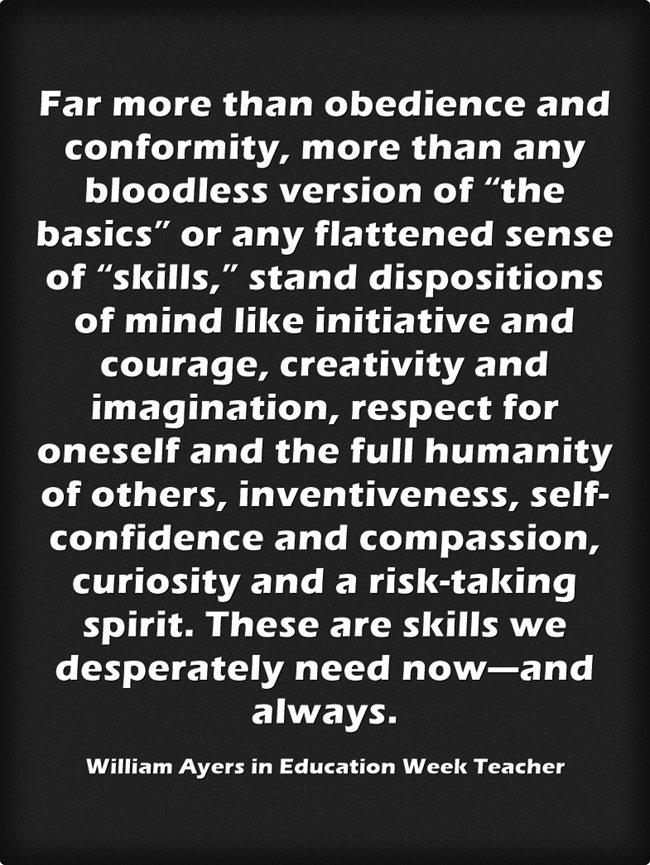How will teaching and schools look different 20 or 30 years from now? Or will they?
This is an excerpt from Larry Ferlazzo’s Edweek Classroom Q&A.
Response From William Ayers
William Ayers, formerly Distinguished Professor of Education and Senior University Scholar at the University of Illinois at Chicago (UIC) has written extensively about social justice and democracy, and teaching as an essentially intellectual, ethical, and political enterprise. His books include Teaching with Conscience in an Imperfect World: An invitation, and To Teach: The Journey, in Comics:
Not long ago I picked up an “annual report” bearing the lofty title “Building 21st Century Schools/Creating the Global Citizens of Tomorrow.” I was interested to see how one large Chicago-based foundation was thinking about where we’re going.
The authors of the report were positively giddy about the testing and sorting regime now stampeding through the nation’s public schools, as well as the vast potential of market-based school reform to crush the Indians or the Chinese in any future economic competitions. The report was–Surprise!–brutally boring.
My thoughts wandered to our wondrous, wiggly, curious, full-tilt three-year-old grandson–what the foundation cooly calls a “global citizen of tomorrow.” This particular GCoT attends a slightly shabby preschool that sparkles with energy and positive relationships. He loves his little school: the sand and the water, the garden and the climbing gear, the blocks and the books, and mostly, of course, being with his friends, all the other pint-sized GCoT’s. He and most of his group will graduate high school after 2030.
What will the world be like for him and his wee friends at that point? What will they need to know and be able to do to live full and meaningful lives? What “measurable outcomes” will prepare them to dive into the wreckage of the 21st century with hope and energy?
I’ve got no idea, and neither does anyone else—not the self-styled think-tanks cranking out their immodest reports on the future of this or that, and certainly not that self-assured foundation.
OK, wait. I do have one idea: I’d recommend that our grandson and his pals store water.
But beyond that, the challenges, problems, and opportunities they’ll face are a blizzard of possibilities, way beyond reach. Specific job-and-skills-training projections seem feeble and silly. The changes we’ve seen in the last two decades alone have been breath-taking, and the rate of change is accelerating day by day.
It’s practically inevitable when dreaming about the future to find yourself firmly in the thrall of the present: we either imagine a future much like today, except more so, or we pick a preferred strand out of the cauldron of contradiction and contestation swirling around us, and we imagine that thin thread to be the winner.
So maybe schools will be drill-and-skill factories run by teacher-bots, or maybe school funding will be be vastly uneven—like today, but more so—one school with a new state-of-the-art campus, generous resources and fantastic materials while another school just down the street would be housed in an abandoned warehouse with broken windows and a busted furnace; in one school class size would be limited to fifteen while in the other it would be allowed to balloon up to forty or more students per teacher.
Students of the privileged would get a curriculum of question-asking and problem-posing, while the others would be monitored obsessively and disciplined with a high-tech electronic management app—any deviation from the rules or procedures and the misfits would be immediately ejected—with inputs and outputs and cognitive growth measured at the end of each day.
Getting over the delusional urge to prescribe a set of skills for ready-use in 2030 or 2050 can actually liberate us to foreground and emphasize those things that will likely serve all of us, right now as well as 30 years from now. Far more than obedience and conformity, more than any bloodless version of “the basics” or any flattened sense of “skills,” stand dispositions of mind like initiative and courage, creativity and imagination, respect for oneself and the full humanity of others, inventiveness, self-confidence and compassion, curiosity and a risk-taking spirit. These are skills we desperately need now–and always.
Uncertain about where we’re going, I’m happy to fight for schools where these qualities and dispositions will count.
Read the all the responses to Larry Ferlazzo’s question here.

